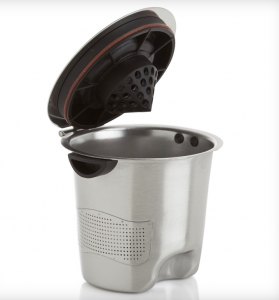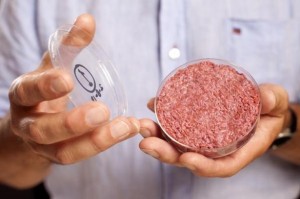 If you love the convenience of Keurig K-cups, but recognize the wastefulness of these, then you might want to check out refillable K-cups like this Ekobrew. The stainless steel construction should help it last a long time, and you can fill it with any of your favorite ground coffees. It can be bought for $17 at Amazon, or there’s also a plastic version available for just over $8.
If you love the convenience of Keurig K-cups, but recognize the wastefulness of these, then you might want to check out refillable K-cups like this Ekobrew. The stainless steel construction should help it last a long time, and you can fill it with any of your favorite ground coffees. It can be bought for $17 at Amazon, or there’s also a plastic version available for just over $8.
Would you eat synthetic meat?
 As you probably heard already, researchers in Europe have managed to grow meat in laboratory conditions, starting out with cow stem cells. They even went a step further and cooked and ate the meat, reporting ho-hum results – the lack of fat was an issue. As my grandfather used to say, “The fat is where the flavor is.” Indeed. So flavor aside, it proved to be a pretty decent substitute, reportedly. The potential here is huge…meat production is widely criticized as not only inhumane, but a significant contributor of greenhouse gas. As the population grows, demand for food will grow with it, so this has the potential to greatly help offset that demand.
As you probably heard already, researchers in Europe have managed to grow meat in laboratory conditions, starting out with cow stem cells. They even went a step further and cooked and ate the meat, reporting ho-hum results – the lack of fat was an issue. As my grandfather used to say, “The fat is where the flavor is.” Indeed. So flavor aside, it proved to be a pretty decent substitute, reportedly. The potential here is huge…meat production is widely criticized as not only inhumane, but a significant contributor of greenhouse gas. As the population grows, demand for food will grow with it, so this has the potential to greatly help offset that demand.
What I found really interesting though was a question on FastCompany – Would vegans and vegetarians eat synthetic meat? It’s an interesting conundrum (YES! I’ve been wanting to use that word in a post for a while now). There’s also the aspect of food safety…with concerns like Mad Cow Disease, growth hormones, pink slime, etc, the idea of a tightly controlled lab environment for your food supply has its appeal.
Others are working on the synthetic meat problem too, and with backers such as Sergey Brin, Bill Gates, and Peter Thiel throwing their support at these projects, I think it’s only a matter of ‘when’, not ‘if’, you’ll be ordering a test tube burger at McDonald’s within the next decade.
Pepsi decides to stop using a known carcinogen
The power of corporate greed is such that, even after 4-methylimidazole was found to cause cancer, Pepsi continued to ship product containing it. They removed it from product sold in California after a new law requiring labeling of carcinogens, but it’s taken until now for them to commit to removing it nationwide (and even then, not until around the end of 2013). Well, at least they’re finally taking this step. You’re probably still better off sticking with tap water though!
(via smartplanet)
Roundup herbicide linked to cancer, autism, parkinson’s alzheimer’s
Well I think the title says it all…Monsanto’s Roundup herbicide is really nasty stuff that studies are showing has a link to some really nasty human diseases. Add to that the increased use of crops that have been genetically modified to be roundup-resistant, and you should start being concerned about the safety of your food supply. Do yourself a favor and either buy organic foods, or grow your own vegetables! (read more at The Good Human)
Avoiding GMOs may be harder than you think
It’s hard enough to avoid GMO foods when there are no laws requiring the labeling of them, but it’s harder once you learn that other common ingredients may be manufactured from GMOs. For example: if you see maltodextrin in the list of a product’s ingredients, know that most of that is made from GMO corn (unless the product is labeled as “USDA Organic”). Vitamin C is another GMO corn product (mostly). Same with ascorbic acid. Will these GMO products cause you harm? That’s the big question, and frankly until the scientific testing has been done to show that a particular GMO crop is safe to eat, it’s best to avoid this stuff (IMHO).
(read more about this at Care2)

